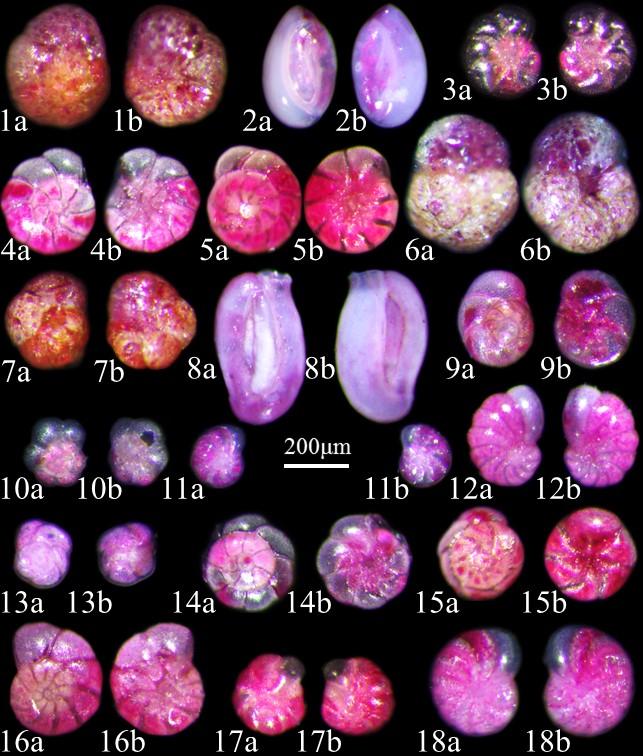Responses of benthic foraminifera to changes of temperature and salinity

Micrographs of benthic foraminifera from culture experiment. Credit: ©Science China Press
This study is published in the journal Science China Earth Sciences with title of Responses of benthic foraminifera to changes of temperature and salinity: Results from a laboratory culture experiment. Prof. Yanli LEI from Institute of Oceanology Chinese Academy of Sciences is corresponding authors of this article.
Through laboratory culture experiment, the researchers only changed the temperature and salinity, while controlling other environmental parameters consistent. They conducted a two-factor crossed experiment in which foraminiferal communities were cultured at different temperatures (6, 12, and 18°C) and salinities (15, 20, 25, and 30 psu) for 10 weeks.
The research revealed the different response of benthic foraminifera communities to the change of temperature and salinity.
Scientist knows little about the response of benthic foraminifera to environmental factors. Environmental factors are not independent, and the responses of foraminifera usually reflect the combined effects of the measured environmental factors and other unknown biotic and abiotic factors in the field.
Therefore, it is difficult to discern cause-effect relationships between environmental factors and changes in benthic foraminiferal community in field studies, especially with interactive effects.
To solve this problem, laboratory-controlled culture methods were used in this study. The researchers cultured the entire foraminiferal communities with the natural sediments from the intertidal area of Qingdao Bay for 10 weeks. They analyzed and compared the foraminiferal community under different conditions of temperature and salinity.
The study showed that temperature affected foraminiferal community more significantly than salinity. In addition, with increasing temperature, the species composition shifted from hyaline taxon to porcellaneous taxon.
This study indicates that the benthic foraminiferal community is very sensitive to the change of environmental factors (e.g., temperature and salinity) and it can be used to indicate the changes in the marine ecosystem. At the same time, this finding has important scientific significance and reference value for reconstructing the paleoenvironment by using benthic foraminiferal community composition.
###
This research was funded by the National Natural Science Foundation of China (Grant Nos. 41476043, 41630965 & 41830539), the Strategic Priority Research Program of the Chinese Academy of Sciences (Grant No. XDA11030104), the National Program on 'Global Change and Air-Sea Interaction' (Grant No. GASI-03-01-03-01), the Continental Shelf Drilling Program of China (Grant No. GZH201100202), the Paul Brönnimann Foundation 2014.
See the article: Shuaishuai DONG, Yanli LEI, Tiegang LI, Zhimin JIAN. 2018. Responses of benthic foraminifera to changes of temperature and salinity: Results from a laboratory culture experiment. Science China Earth Sciences, 61 https:/
Media Contact
All latest news from the category: Earth Sciences
Earth Sciences (also referred to as Geosciences), which deals with basic issues surrounding our planet, plays a vital role in the area of energy and raw materials supply.
Earth Sciences comprises subjects such as geology, geography, geological informatics, paleontology, mineralogy, petrography, crystallography, geophysics, geodesy, glaciology, cartography, photogrammetry, meteorology and seismology, early-warning systems, earthquake research and polar research.
Newest articles

First-of-its-kind study uses remote sensing to monitor plastic debris in rivers and lakes
Remote sensing creates a cost-effective solution to monitoring plastic pollution. A first-of-its-kind study from researchers at the University of Minnesota Twin Cities shows how remote sensing can help monitor and…

Laser-based artificial neuron mimics nerve cell functions at lightning speed
With a processing speed a billion times faster than nature, chip-based laser neuron could help advance AI tasks such as pattern recognition and sequence prediction. Researchers have developed a laser-based…

Optimising the processing of plastic waste
Just one look in the yellow bin reveals a colourful jumble of different types of plastic. However, the purer and more uniform plastic waste is, the easier it is to…



